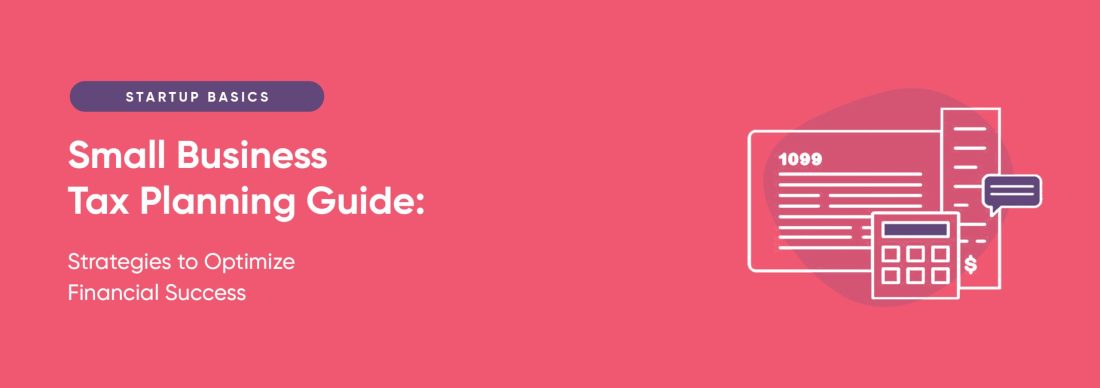Small Business Tax Planning Guide
May 13, 2023 | 20 Min Read


Jump to Sections
-
Importance of Tax Planning for Small Businesses
-
Business Structures and How They Impact Tax Payments
-
What Taxes Need to Be Paid and When They Need to Be Paid
-
Staying Informed of Changes in Tax Laws
-
What Are Tax Deductions and Credits
-
Need for Accurate Bookkeeping and Accounting Software
-
How Accountimize can help
Stay updated
with our Blogs
We will keep you updated about our latest blogs
Share This Blog
Managing finances can be challenging for small businesses, and taxes can be a major headache. Without proper tax planning, small businesses can end up paying unnecessarily more in taxes, hurting their bottom line. However, with a little planning and foresight, small businesses can optimize their financial success by implementing tax planning strategies.
Importance of Tax Planning for Small Businesses
Here are some of the key reasons why business tax planning is important for small businesses:
Minimizes Tax Liability: A key benefit of tax planning is that it helps small businesses minimize their tax liability. Effective tax planning can help determine deductions and credits that can be used to reduce the amount of tax payable, ultimately optimizing the financial success of the business.
Avoiding Penalties and Fines: Proper tax planning strategies can help small businesses avoid penalties associated with noncompliance with tax laws and regulations. Small businesses can avoid costly penalties by ensuring that tax payments are made on time and accurately filed.
Cash Flow Optimization: Small businesses can increase their cash flow by minimizing their tax liability and reinvesting these tax savings into their business. This additional cash flow can be used for expanding the business, capital expenditures, or paying off business debts, ultimately contributing to the long-term financial success of the business.
Improves Decision-Making: Businesses can make well-informed business decisions through effective tax strategy. This can be done by understanding the tax implications of different business decisions, such as purchasing equipment or hiring employees.
By investing time and resources into tax planning and strategy, small businesses can optimize their financial success and stay competitive in their industry.
Business Structures and How They Impact Tax Payments
Tax liabilities can be significantly impacted by the business structure of a small business. For example, a sole proprietorship is taxed differently than a corporation, and the structure of a business can affect the owner’s personal tax liability. Consulting with a tax accountant or CPA firm can help small business owners understand the tax implications of their business structure and identify opportunities to optimize their tax payments.
Here are some of the key ways that different business structures can impact tax payments:
Sole Proprietorship: A sole proprietorship is the simplest form of business structure, in which the business is owned and operated by a single individual. In this type of business, the owner is responsible for all aspects of the business including reporting all incomes and expenses of the business for personal tax returns as well as making self-employment tax payments on net income.
Partnership: A partnership is a business structure where two or more individuals share ownership of the business. In a partnership, each partner reports their share of the business income and expenses on their personal tax return and pays taxes on their share of the profits.
Limited Liability Company (LLC): An LLC is a business structure that combines the flexibility and tax benefits of a partnership with the liability protection of a corporation. In an LLC, the owners report their share of the business income and expenses on their personal tax returns and pay taxes on their share of the profits. LLCs are not taxed as separate entities.
Corporation: A corporation is a separate legal entity that is owned by shareholders. In this type of business, the corporation pays taxes on its profits while shareholders pay taxes on any dividends they receive.
What Taxes Need to Be Paid and When They Need to Be Paid
Small businesses are required to pay various kinds of taxes. The timing and frequency of these payments vary depending on the type of tax, as well as the size of the business and its revenue. Accurately tracking and managing tax payments is crucial for small businesses to avoid penalties and interest charges. The following are some of the key taxes that small businesses need to be aware of:
Income Tax: Small businesses are required to pay income tax on their profits, which is the amount of money net of business expenses. The income tax rate varies depending on the structure of the business and the amount of income earned.
Self-Employment Tax: Self-employment tax is a tax paid by individuals who work for themselves, such as those running a sole proprietorship, partnership, or LLC.
Employment Taxes: Small businesses that have employees are required to pay various employment taxes, including withholding income tax, and Social Security tax.
Sales Tax: Small businesses that sell goods or services that are subject to sales tax must collect and remit the tax to the relevant tax authority.
Property Tax: Small businesses that own real estate or personal property are required to pay property tax on those assets.
Using tax software or working with a tax professional at a CPA firm, can help small business owners manage their tax obligations and stay on top of deadlines.
Staying Informed of Changes in Tax Laws
Tax laws and regulations are constantly changing, and small businesses need to stay current to ensure they comply with the latest regulations. Subscribing to newsletters, attending seminars on tax, and consulting with a CPA firm can help small business owners make informed decisions about their tax planning and strategy.
Want to learn about the next steps for growing your business ?
What Are Tax Deductions and Credits
Tax deductions and credits are two ways that small businesses can reduce their tax liability. Working with a tax accountant or CPA firm can help small businesses identify and properly claim any tax deductions and credits.
Tax Deductions: Tax deductions are expenses that can be subtracted from a business’s taxable income, ultimately reducing the tax payable. Common tax deductions for small businesses include expenses such as rent, utilities, equipment, and supplies.
Tax Credits: Tax credits are a dollar-for-dollar reduction in the amount of taxes owed. Tax credits, unlike deductions, directly reduce the amount of taxes owed.
Deductible Business Expenses: Small businesses should be aware of all the deductible business expenses that can be claimed on their tax returns. These can include expenses related to the cost of goods sold, wages paid to employees, insurance premiums, and interest on business loans.
Eligibility for Tax Credits: Small businesses should also be aware of their eligibility for tax credits, as they can significantly reduce the amount of taxes owed.
Need for Accurate Bookkeeping and Accounting Software
Accurate bookkeeping services and accounting software is vital for small businesses to manage their finances and optimize their tax planning. A well-organized financial system can help businesses keep track of their expenses, income, and tax liabilities, as well as identify opportunities to reduce their tax payments. Consulting with a CPA accounting firm can help small business owners identify the best accounting software to ensure that their bookkeeping practices are accurate and compliant.
Below are some of the reasons why accurate bookkeeping and accounting software are important:
Tax Compliance: Accurate bookkeeping and accounting records are essential for small businesses to stay in compliance with tax laws and regulations. With accurate records, small business owners can easily track their income, expenses, and deductions, and ensure they are paying the correct amount of taxes.
Financial Management and Growth: With accurate records, small business owners can track their cash flow, monitor their expenses, and make informed financial decisions.
Accurate bookkeeping and accounting records are also important for small businesses that are looking to grow and expand. With accurate records, small business owners can demonstrate their financial stability and attract investors/financers.
Tax Audit Protection: Accurate bookkeeping and accounting records can also help protect small businesses in the event of an audit. In the event of an audit, small businesses will be required to provide detailed financial records to the taxing authorities. Therefore, accurate records can make the audit process smoother.
To ensure accurate bookkeeping and accounting records, small business owners should consider using accounting software, such as QuickBooks or Xero. These software programs can help automate and streamline the bookkeeping and accounting processes, reducing the risk of errors. Hence, making it easier to stay on top of your finances. If bookkeeping and accounting are outside of a small business owner’s expertise, they should consider hiring a bookkeeper or working with a CPA firm such as Accountimize to manage their finances.
Make Use of a Tax Professional: How Accountimize can help
Finally, working with a tax and bookkeeping professional such as Accountimize can help small business owners optimize their tax planning strategies. We provide seamless end-to-end tax preparation services with an in-house team of tax consultants who not only understand your business needs but also help you grow.
Whether your business is registered in Canada or USA, our team of CPAs is experts in the local, provincial, county, state, and federal taxes of the respective country who will not only ensure your firm is compliant with all tax laws but also have the insight to take your business to the next level.
Book a Discovery call


Stay updated
with our Blogs
We will keep you updated about our latest blogs



